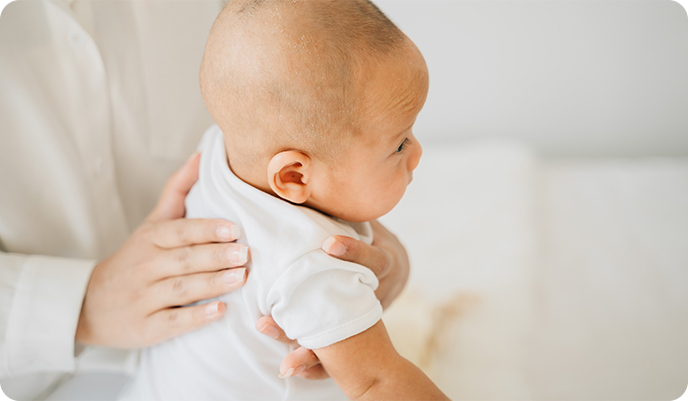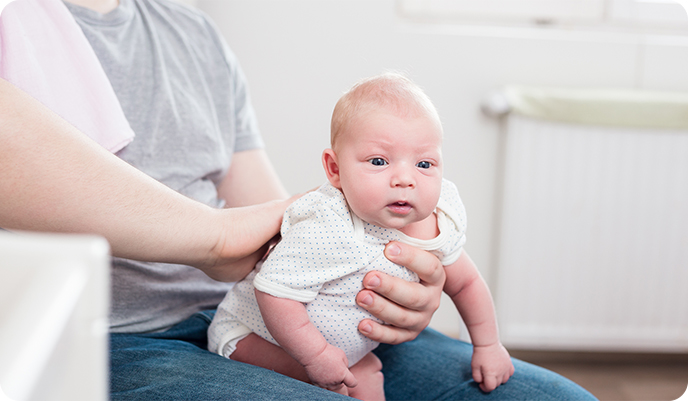Winding or burping your baby is an important part of their feeding routine, but we understand that it can sometimes be tricky business! Trapped wind can cause your little one discomfort which can be upsetting to see, especially if you are unsure of how to help.
If you’re a first-time parent you may have a few unanswered questions, whether it’s knowing when your little one needs winding, or finding the most comfortable position for both you and your baby. It can take time to find what works for your baby, so we’ve put together some of our top tips to help you get started.

WHEN TO WIND YOUR BABY
Every baby is different, so there are no rules on when you should wind your baby.
Babies will often swallow some air along with breast milk or formula milk, and these air bubbles can sometimes become trapped in their tummy, causing discomfort and making your baby feel full before they have finished feeding.
As newborns can't move around much on their own, and their digestive system is still developing, your little one may need some help to get rid of this wind during or after their feed. If your baby seems to be content and falls asleep during or after a feed, then there may not be a need for winding. However, if your baby seems irritable or unsettled after a feed, or if they are wriggling or pulling away during a feed, they may need some help from you.
Your little one will usually let you know when they have trapped wind, over time you will get to know your baby’s cues.

HOW TO WIND YOUR BABY
Gently patting or rubbing your baby's back is the most effective way to get them to bring up wind and trying different positions will help you find the one that works for you and your baby. You don’t need to spend a long time doing this, once you've found the right position, you will usually only need to spend a few minutes each time.
Here are three positions you can try:
Over your shoulder
Place your baby over your shoulder with their chin resting on your shoulder. Support your baby’s bottom with your arm on that side, gently rub and pat their back with the other hand. It might help to walk around as you are doing this.
Sitting up
Sit your baby on your lap, facing away from you. Place the palm of your hand flat against their chest and support their chin and jaw, without putting any pressure on the throat. Then lean your baby forward slightly and gently rub and pat your baby's back with your free hand.
Lying down on your lap
Lie your baby across your lap face down. Gently support their chin, don't put any pressure on the throat area and use your free hand to gently rub and pat your baby's back.

OUR TOP TIPS FOR WINDING YOUR BABY
If you’re finding your baby often gets a little trapped gas, here are a few of our top tips when it comes to winding your newborn or baby:
- Before you begin, remember to always have a cloth or muslin square to hand as your baby may bring up some milk (don’t worry this is completely normal!)
- Keep your baby upright during feeds. This will help the milk to settle to the bottom of their stomach, while the air rises to the top, so it's easier for them to burp it up.
- Try skin-to-skin contact, as this may relax your baby, helping wind to come up more easily.
- Walk with your baby in your arms or in a baby sling - the upright position gently helps to relax them. You could even try adding a gentle bounce to your walk.

WHAT IF MY BABY WON'T BURP?
If these positions don't work and your baby is still showing signs of trapped wind after feeding, try giving them a warm bath to help them relax, followed by lying them on their back and gently massaging their tummy. You can also try moving your baby's legs back and forth, like they're riding a bicycle.
If this doesn't work, talk to your health visitor and they will be able to advise you on the best thing to do. For many babies, the need for winding is just a normal phase and soon they'll find it easy to burp, others may need a little more help.
As your baby gets older, they will learn to feed more efficiently, without swallowing as much air, so you may not need to feed them as often. Your baby should soon grow out of the need to be winded as they grow up and become more active. In the meantime, keep those muslin squares close to hand at every feed - trust us, you never know when your little one will surprise you with a little vomit!
For more helpful newborn tips, read ‘What To Expect From A Newborn’ or head to our Facebook or Instagram page to let us know which is your favorite winding position!
Related posts
Metanium Nappy Rash Ointment is a medicine. Always read the label.




